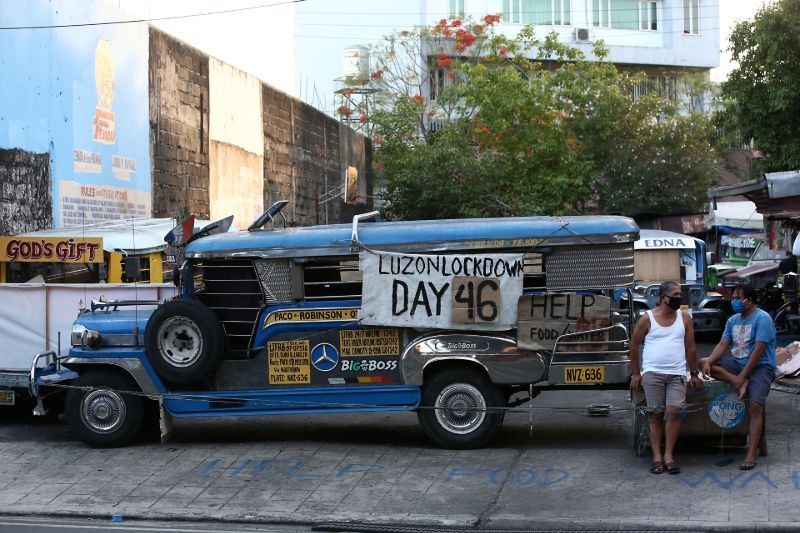Premature GCQ in Metro Manila could add 24K cases, 1,700 deaths by June — UP study

MANILA, Philippines — Thousands more could die should the enhanced community quarantine over Metro Manila be eased in the coming days, researchers from the University of the Philippines warned in an updated study.
Based on existing data, the study—conducted by UP professors and OCTA Research fellows Guido David, Ranjit Singh Rye, and Maria Patricia Agbulos—formulated mathematical scenarios and projected that the gains of the enhanced community quarantine could be reversed if it were to be lifted prematurely.
As of this writing, local governments of Metro Manila cities are mulling the possibility of graduating to a relaxed general community quarantine after May 15.
President Rodrigo Duterte is expected to decide by Monday night whether the ECQ in some areas will be lifted or extended.
"Data suggest that a premature relaxation of the ECQ in the NCR may result in an escalation of 24,000 cases and 1,700 deaths by June 15, 2020,” the researchers said.
READ: DILG optimistic Metro Manila will 'graduate' to GCQ on May 15
According to the study, the over 50 days or 7 weeks of enhanced community quarantine were very much effective in reducing the rate of transmission of COVID-19, and opting for such a shift without a flatter curve would be counterproductive.
"Ending the ECQ prematurely may disrupt the flattening of the curve. There are possible rebound effects and increase in transmissions. Since the curve is close to flattening, it is advisable to wait until the curve has flattened before the ECQ is lifted," the study read.
"One possible scenario caused by lifting the ECQ prematurely shows a surge in deaths from 650 to 3,800 and in the number of Covid-19 cases from 10,000 to 80,000 by May 31, 2020," the study added.
The study also pointed out gaps in existing testing efforts, saying that "the higher number of cases for older patients, and low number of cases for those below 25 years of age, indicate an unknown number of asymptomatic and mildly symptomatic cases."
Rising cases
However, the Health Department has attributed the continuing rise in cases to clerical backlog being cleared as the country improves its testing capabilities. On Sunday afternoon, the department tacked on 184 new cases, bringing the total number of active cases to 8,151.
COVID-19 has claimed 719 lives in the Philippines.
Mass randomized testing, better contact tracing needed
"Asymptomatic cases, if not diagnosed, may still interact with the general population and potentially spread COVID-19. There is the danger that asymptomatic cases may act as super spreaders of Covid-19," the study read.
"Mass randomized testing and contact tracing will help determine the actual number of cases, including asymptomatic and mildly symptomatic cases, and will help control the spread of COVID-19 by identifying and tracking the silent spreaders of the disease."
The study urged the national government to guarantee minimum health safeguards, including:
- mass randomized testing capability
- effective contact tracing,
- sufficient health facilities, equipment, and isolation areas to deal with Covid-19 cases and other diseases in the area.
"Once we confirm that an individual is infected with the virus through mass testing, we need an efficient and effective contract tracing system to track those who could have been exposed to the infective individual. To this end, the national and local government should consider hiring and training more personnel to do contact tracing," the study read.
As it stands, the Philippine National Police has been put in charge of handling all contact tracing efforts for probable and suspect cases.
RELATED: No more warning before arrest under 'tighter' ECQ as PNP leads contact tracing
The enforcement arm of the IATF-EID has said that it foresees more people going outside of their homes under GCQ. Police Lt. Gen. Guillermo Eleazar, who heads the Joint Task Force Corona Virus Shield (JTF CV Shield), said that a transition to general quarantine would mean heightened police visibility.
As of Friday, there were 131 confirmed patients of the new pathogen among the ranks of the national police.
"In any case, the ECQ has proven to be successful, especially for a nation that has been challenged in many areas, specifically the lack of available mass testing and hospital facilities. The ECQ needs to be continued in certain areas in order to win the war against Covid-19," the study read.
An earlier iteration of the report is accessible on the University of the Philippines' website and can be viewed here:
- Latest
- Trending

































